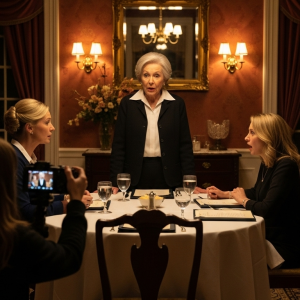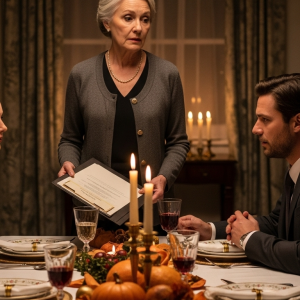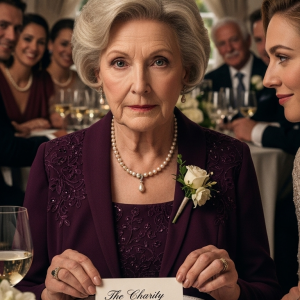When red wine exploded across my $50,000 rental gown, I smiled at my new daughter-in-law and calmly told her she’d just made the biggest mistake of her privileged life. I walked out of that wedding reception with wine dripping from my designer beadwork, and by the time I reached my car, I had already decided to destroy her family’s empire.
Three months later, she would learn exactly what happens when you humiliate a woman who spent thirty years as a forensic accountant.
Let me back up. The disaster started six months earlier when my son, David, announced his engagement to Vanessa Ashford. I should have known then that trouble was brewing. She was stunning, in that perfectly polished way only immense wealth can buy, but she looked at me during our first family dinner like I was a piece of furniture that didn’t quite match her decor.
“Mom, Vanessa’s family owns Ashford Industries,” David had said, his chest puffed with pride. I knew the name. Any accountant worth her salt did. A multi-billion-dollar empire with fingers in everything from logistics to real estate. Old money. The kind that builds dynasties.
The wedding planning was a nightmare. Vanessa’s ideas were all expensive and designed to remind everyone which family was footing the bill. The venue had to be the Ritz-Carlton. The flowers, imported from Belgium. Even the dress she insisted I wear was a spectacle.
“You simply must wear something spectacular, Margaret,” she’d insisted. “A Divine original.” Fifty-thousand dollars for a rental. I nearly choked. “Consider it our gift to you,” Vanessa waved away my concern. “You’re going to be family, after all.”
The wedding day dawned perfect. The ceremony was at the family estate with 300 of their closest friends. I counted maybe twenty people from our side, lost in a sea of society faces. I was making small talk during the reception when it happened. I was holding a glass of water when a single drop fell onto the hem of Vanessa’s dress.
“Oh my goodness, I’m so sorry!” I’d immediately grabbed a napkin. That’s when Vanessa’s face changed. For a split second, I saw something cold and calculating in her eyes. Then she gasped, stepped back, and somehow, her full glass of red wine tipped over, cascading down the front of my dress.
“Oh no!” she cried, her hand flying to her mouth in mock horror. “I’m so sorry, Margaret. I’m just so clumsy when I’m startled.”
The entire reception turned to stare. I stood there, wine creating an ever-expanding stain across the silk. This hadn’t been an accident. This was a power play, a deliberate humiliation designed to put me in my place. That’s when I smiled.
“Don’t worry about it, darling,” I told her, my voice carrying clearly. “Accidents happen. Though, the rental company is going to be very upset about this. Fifty-thousand dollars is a lot of money, even for an accident.”
I left through the garden, my dignity intact. But as I sat in my car, hands shaking with rage, I realized something important. Vanessa Ashford had just made a critical error. She’d assumed I was some harmless older woman she could dismiss without consequence. She had no idea who she was dealing with.
Three days after the wedding, the rental company’s bill arrived: $57,000 for a destroyed designer gown. I paid it without blinking. Then I did something Vanessa would never expect. I started digging.
Thirty years as a forensic accountant teaches you one truth: everyone has secrets, and rich people have the most expensive ones. I’d built my career unraveling financial mysteries. I knew how to look where others couldn’t see.
On the surface, Ashford Industries looked pristine. Billions in revenue, steady growth. But I’d learned long ago that the surface is where people paint their prettiest lies. My friend Linda, who still worked at my old firm, helped me access the federal databases we used to use.
That evening, David called. “Mom, Vanessa’s really upset about the dress. Her father wants to pay for it.”
“How generous,” I replied. “Tell Mr. Ashford the bill was $57,000, and I’ve already paid it.” The silence on the other end was telling. “Vanessa said it was just a regular dress,” he finally mumbled.
“Interesting,” I said. After I hung up, I stared at the financial documents scattered across my desk. Ashford Industries was massive, but complexity often masked simple theft. I’d already found three discrepancies: shell companies receiving large payments for no apparent purpose, and shipping routes that didn’t match cargo manifests. It was like finding a loose thread on an expensive sweater. You could ignore it, or you could pull.
I called Linda back. “How would you feel about doing a little freelance work? The paying kind.”
“Margaret, what are you getting into?”
I looked at the wine-stained dress hanging in my closet, the $57,000 reminder. “Something I should have done years ago,” I said. “I’m going to find out exactly how the Ashford family really makes their money.”
Two weeks into my investigation, I found the first smoking gun. A subsidiary, Ashford Maritime Solutions, had reported cargo worth $12 million moving through Charleston, but customs declarations showed only $8 million. Four million dollars in merchandise had vanished between the manifests and the tax returns.
My phone rang. It was David. “Mom, we need to talk. Vanessa’s father wants to meet with you. He feels bad about the dress. He wants to take you to lunch… maybe discuss some business opportunities.”
How interesting. Richard Ashford was already seated at Romano’s when I arrived, a picture of distinguished, silver-haired confidence. “Margaret, thank you for meeting me,” he said, his handshake firm. He insisted on reimbursing me for the dress.
“Fifty-seven thousand dollars seems quite steep for a rental, don’t you think?” he probed, testing me.
“I suppose that depends on whether you consider it steep to maintain one’s dignity in front of three hundred strangers,” I countered. He leaned back slightly, reassessing. Good.
Then came the offer. “We’re always looking for experienced consultants at Ashford Industries,” he said smoothly. “Project assessment, due diligence… having an experienced eye review our processes could be invaluable.”
It was a classic move. If you can’t neutralize a threat, try to buy it. Better yet, make them complicit. But Richard had made a crucial mistake: he’d assumed I needed their money more than I needed the truth.
“That sounds wonderful,” I said, smiling. “I’d love to learn more about your business practices.”
Three days later, a courier delivered a package containing contracts and, most interesting of all, financial records for six different Ashford subsidiary companies. Richard had basically handed me a road map to their entire operation.
“You took the job?” Linda’s voice was high with disbelief when I called. “Margaret, have you lost your mind?”
“On the contrary, I think I just found it. They’ve given me legal access to everything I need. And don’t worry about the confidentiality clause,” I added, scanning a shipping manifest. “It specifically excludes any obligation to conceal illegal activities. Richard’s own lawyers built the loophole.”
By midnight, I’d identified a pattern that made my blood run cold. Ashford Industries wasn’t just hiding income. They were moving money in patterns that suggested money laundering on an international scale. This wasn’t just about tax evasion anymore. This was a family that had built an empire on systematic criminal activity.
The dinner at David and Vanessa’s new house—a $4 million wedding gift from “Daddy”—was a test. They wanted to see how much I knew.
“Daddy mentioned you’re working on some projects for us now,” Vanessa said brightly.
“It’s fascinating work,” I agreed. “Your father’s business model is quite innovative.”
“He says the key to success is staying ahead of regulations,” she gushed. That was certainly one way to put it.
I decided to probe. “That would be helpful, especially with the customs declarations for the Caribbean routes. Some of the cargo values seem inconsistent.”
The quick glance they exchanged was unmistakable. They knew I was looking in the right place. As I drove home, I realized they would try to shut down my access. My phone rang as I pulled into my driveway. An unknown number. Ashford Industries. They wanted a meeting first thing Monday to “revise the parameters” of my contract. They were about to discover they’d invited a grandmaster to a game of chess.
Richard Ashford’s office was a monument to corporate power. “I wanted to discuss your project scope,” he began, sliding a revised contract across his massive desk. The new version limited my review to “domestic operational efficiency.” In other words, they wanted me to analyze their office supply budget.
“This is quite a change,” I said carefully.
“We realized the initial scope was perhaps too ambitious,” he lied smoothly.
I closed the folder. “This is very generous, but I’m afraid I can’t accept these terms. My professional reputation is built on providing thorough, comprehensive analysis.”
His mask slipped, revealing the steel underneath. “I think you should consider your position carefully, Margaret. Family relationships can be delicate.” A threat. If I didn’t back down, they’d turn my son against me.
“Mr. Ashford,” I said, standing. “You’ve made the mistake of assuming I need something from you. Your money, your approval, your family’s acceptance. The truth is, I don’t need any of those things. What I need is the truth, and I’m very good at finding it.”
His face went cold. “Be very careful, Margaret. You’re playing in a league you don’t understand.”
I smiled. “Mr. Ashford, I’ve spent thirty years unraveling financial crimes far more sophisticated than anything your family has managed. You’re not playing in a league I don’t understand. You’re playing a game I helped invent.” By the time I reached the lobby, my phone was ringing. It was Sarah, my contact at the Treasury Department.
“Margaret,” she said, “I just got your message. How soon can you get me the documentation?”
I stepped out into the drizzle, feeling the electric thrill of the hunt. “How about this afternoon?”
Sarah met me at a downtown coffee shop. “Margaret, you beautiful genius,” she said, flipping through the documents. “This is a prosecutor’s dream. You’ve connected transactions across seventeen different subsidiary companies.”
“Twenty-three, actually,” I corrected. “And here’s where it gets interesting.” I showed her the historical records. “The money laundering operation isn’t Richard’s brainchild. It’s a family business going back three decades. They’ve been using their shipping company to move dirty money since the 1990s.”
Sarah’s expression grew grim. “How much are we talking?”
“Conservative estimate? Two hundred million. If we factor in money laundered for other criminal organizations, it’s over a billion.”
“This isn’t just tax evasion anymore,” she said. “This is RICO territory.”
My phone buzzed. It was David, frantic. “Mom! There are federal agents asking questions at Vanessa’s office!”
“David,” I said calmly, “I did exactly what Vanessa’s father hired me to do. I analyzed his business practices and provided my professional assessment to the appropriate authorities.”
“They’re family now!” he yelled.
“Richard Ashford is a criminal who has been laundering money for drug dealers. Your wife is the beneficiary of blood money, David.” I hung up, my hands shaking with heartbreak.
The arrests happened quickly. Richard was taken from his home at 6 AM. But the real breakthrough came from Vanessa herself. In a moment of breathtaking stupidity, after her father’s arrest, she tried to move $18 million to offshore accounts.
“She just graduated from potential witness to primary defendant,” FBI Agent Chen told me in David’s office. “And her transactions led us to accounts we didn’t know existed. Accounts that show the Ashfords were providing financial services to some of the most dangerous criminal enterprises in North America, including a human trafficking ring.”
David looked like he was going to be sick. Then, something hardened in his expression. “What do you need me to do?” he asked Agent Chen.
“Testify against all of them.” David looked at me, the boy he’d been and the man he was becoming. “Will you help me?”
“Of course,” I said. “Let’s destroy them all.”
The trial began a year after the wedding. I sat in the gallery, watching prosecutors lay out the case against the Ashford syndicate. When it was my turn to testify, I looked at the jury. “I spilled a drop of water on my daughter-in-law’s wedding dress,” I said simply. “She responded by deliberately throwing wine on my $50,000 rental gown. That incident made me curious about the kind of people I was dealing with.”
David’s testimony was steady and heartbreaking. But the moment that sealed their fate came from Vanessa. Against her lawyer’s advice, she took the stand. During cross-examination, she couldn’t name a single person her “charities” had helped.
Finally, her composure cracked. “So what if they weren’t real?” she snapped. “Everyone with money finds ways to avoid paying taxes! The only difference is we got caught!”
The courtroom erupted. She had just confessed in open court. The jury deliberated for less than four hours. Guilty on all counts. Richard Ashford got forty-five years. Vanessa got twenty-five.
Six months later, David and I had lunch at Romano’s. “Any regrets?” he asked.
“No,” I said finally. “No regrets at all.”
“You told Vanessa she’d just made the biggest mistake of her life,” he mused. “Did you know then how big it actually was?”
I smiled. “I knew she’d chosen the wrong person to humiliate. I had no idea she’d chosen the worst possible person: a forensic accountant with thirty years of experience, unlimited time, and absolutely nothing left to lose.”




